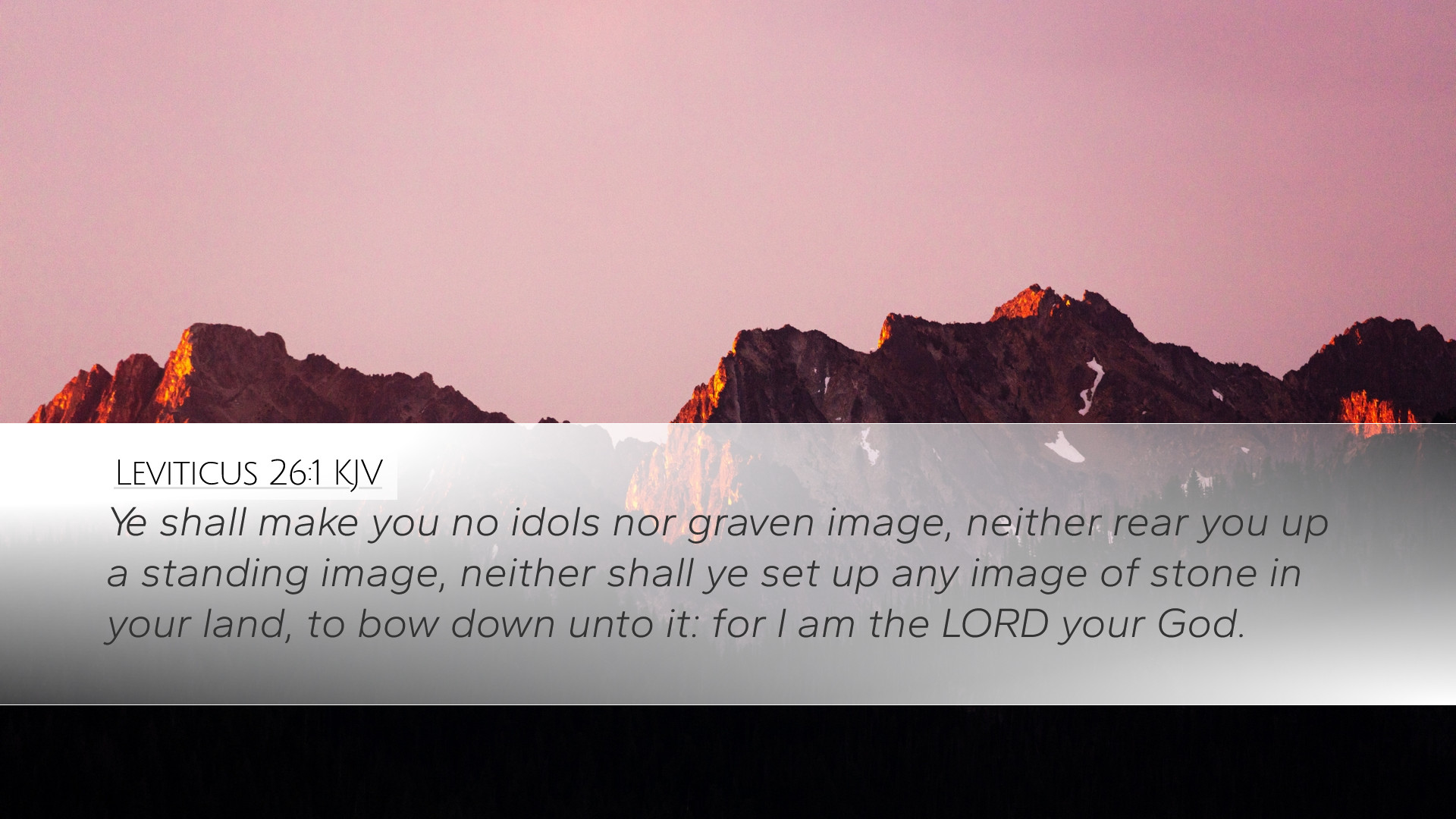Commentary on Leviticus 26:1
Verse: "Ye shall make you no idols nor graven image, neither rear you up a standing image, neither shall ye set up any image of stone in your land, to bow down unto it: for I am the LORD your God."
Leviticus 26:1 begins a vital section of Scripture that outlines the covenant blessings and curses associated with adherence to God's laws. This verse emphasizes the importance of exclusive devotion to God and serves as a prelude to the broader themes of obedience that permeate this chapter.
1. Importance of Idolatry Abstention
Matthew Henry comments on the significance of this command as a fundamental aspect of faith. Idolatry is not just prohibited; it is presented as a direct affront to God’s sovereignty. The Israelites are reminded that any form of idol—whether graven images or standing images—contradicts their essence as a people chosen by the LORD. This underlines God’s intention for His people to maintain a pure worship experience devoid of any distractions that might dilute their loyalty to Him.
2. The Nature of God
Albert Barnes noted that God introduces Himself as the true God — "for I am the LORD your God" — underscoring His divine authority. This clause reinforces the expectation that the law comes from a God who is both loving and authoritative. It insists not only on loyalty but also presents a relational aspect—God desires intimacy and fidelity. Thus, the prohibition against idolatry serves as both a command and an expression of divine love, calling believers into an exclusive relationship.
3. Historical Context
Adam Clarke elaborates on the historical context of this command within the life of the nation of Israel. As they transitioned into Canaan amidst pagan nations, the risk of adopting idolatrous practices was substantial. Clarke emphasizes that God sought to delineate Israel’s identity as distinctly different from neighboring tribes: “You are to be a people distinct from others, in your worship and in your practices.” This sets the framework for understanding the consequences of turning away from God and the merciful call to repentance.
4. Theological Implications
The prohibition against idolatry encapsulates the broader theological narrative found throughout the Scriptures. It anticipates the New Testament admonitions against idolatry, presenting it as a spiritual malady. As mentioned in 1 John 5:21, the Apostle warns believers to "keep themselves from idols," linking Old Testament admonition directly with the Christian experience. The continuity of this command teaches that the rejection of physical idols extends to modern forms of idolatry, such as materialism and autonomy.
5. Implications for Worship
Within this command lies a profound principle regarding the nature of worship itself. Worship should be pure, direct, and transparent to God, which means that any element of idolatry disrupts genuine communion with Him. Matthew Henry reflects this sentiment, asserting that worshipers must strive for sincerity in their approach to God—removing anything that could potentially distract from His glory. This is a crucial lesson for pastors and worship leaders who must guard against the subtle encroachments of contemporary idols within their congregations.
6. Summary of Promises and Curses
The first verse of Leviticus 26 serves as a crux around which the remaining blessings and curses revolve. The absence of idols is tied closely to the promised blessings of God: abundance in the land, peace, and divine presence. Conversely, the ensuing verses elaborate on the consequences that result from unfaithfulness and idolatry, establishing a cause-and-effect relationship that remains vital to understanding the Hebrew covenantal framework.
7. Practical Applications
For pastors and theologians, Leviticus 26:1 offers a rich landscape for application. It calls for personal introspection regarding any modern forms of idolatry—such as career ambitions, relationships, or even self-image—that might rival God’s rightful place in our lives. The call to exclusive worship demands a continuous evaluation of priorities within both personal and communal church practices.
8. Conclusion: The Call to Faithfulness
As we delve into Leviticus 26:1, we are reminded of the timeless nature of God's commands, emphasizing fidelity and the rejection of distractions that detract from our relationship with Him. This verse sets a foundational expectation for holiness, service, and commitment. Pastors, students, and scholars alike can gain from this verse by applying its lessons on worship, fidelity, and the overarching narrative of God's faithfulness to His covenant people.


